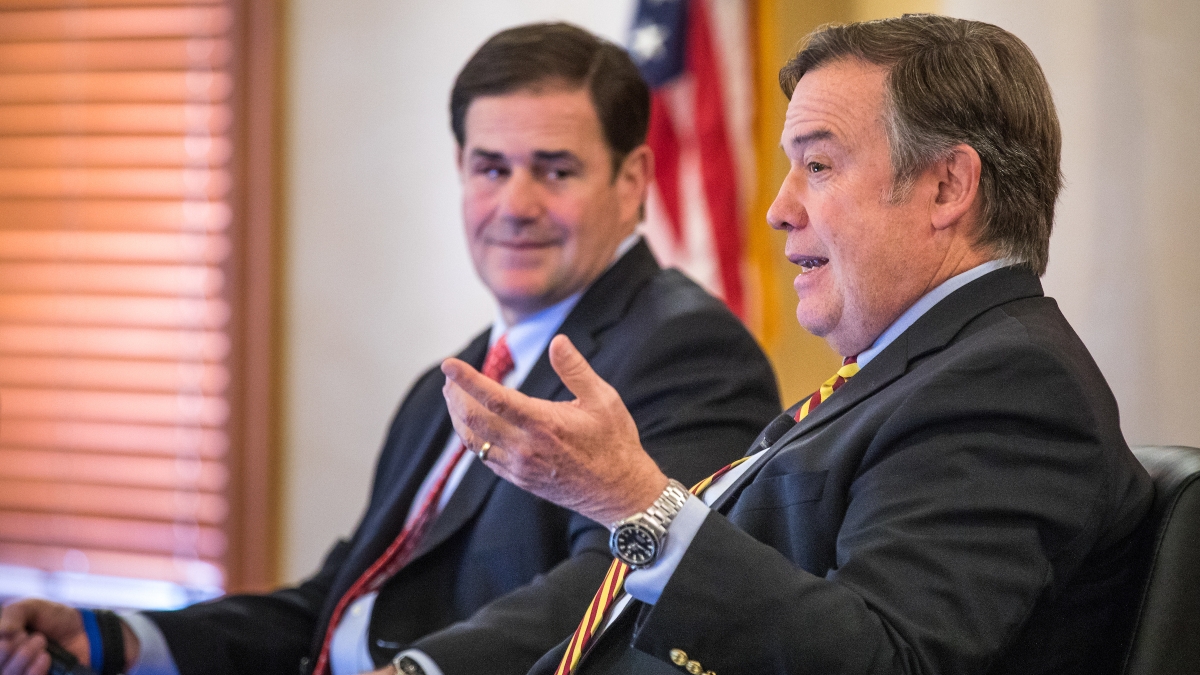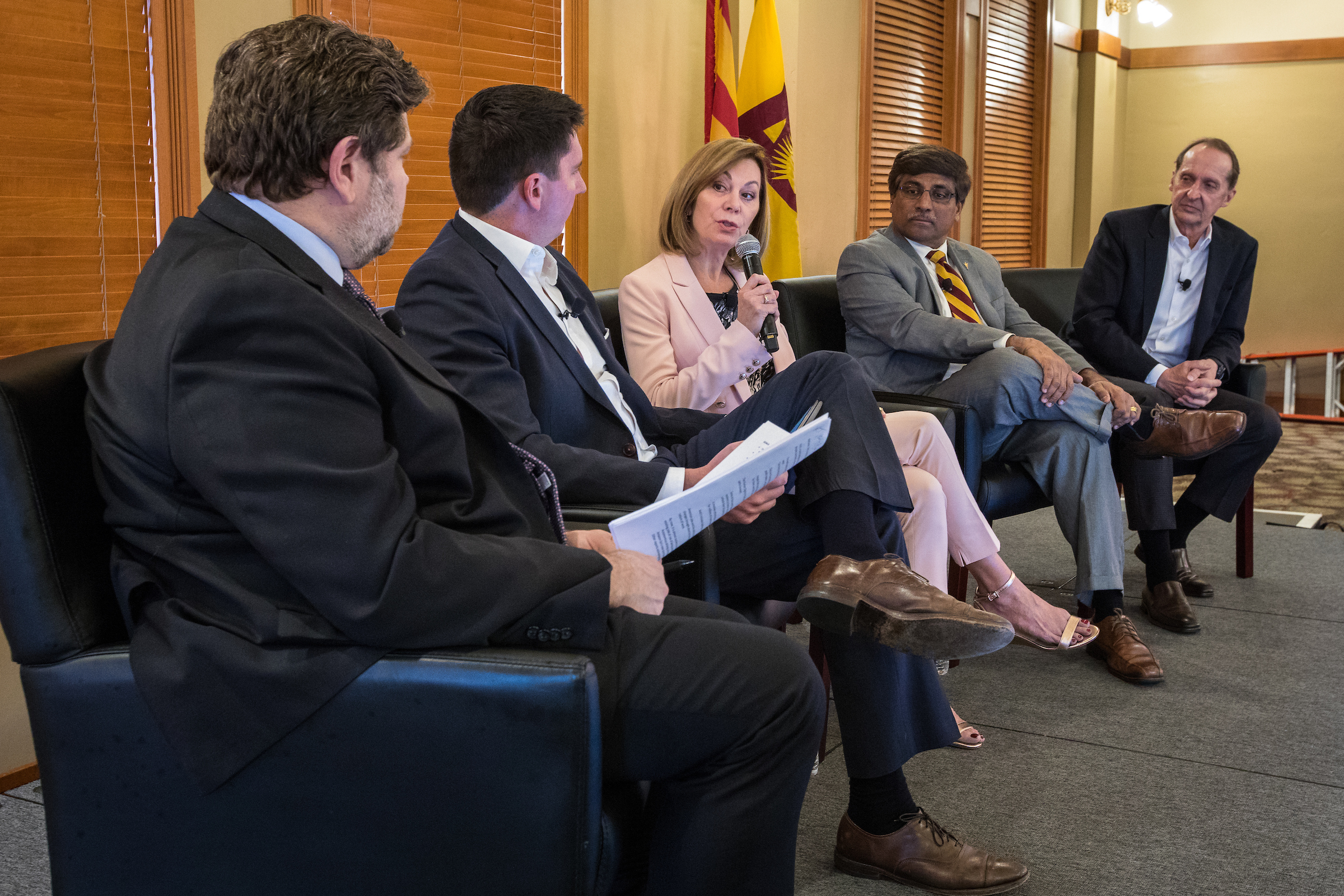Editor's note: This story is being highlighted in ASU Now's year in review. Read more top stories from 2018 here.
Technology has irreversibly disrupted the labor market and now the nation’s education system must change in order to keep up, according to the president of Arizona State University.
Calling the linear system of schooling archaic, Michael Crow said that people should be able to access education at any point in their lives so they can shift from career to career.
“It’s become hierarchical and socially elitist,” said Crow, who spoke at a daylong seminar Wednesday on the Tempe campus titled “Minding the Skills Gap: The Future of Education in the Future of Work.”
The model of K-12 school followed by a job, technical school or university and then a career is too rigid, he said.
ASU is trying to advance the concept of universal learners who can access any learning format at any point in their lives. The university would be a “knowledge core” that offers its resources in different ways — digitally or immersive, to typical and nontraditional students across the lifespan.
“People change their careers, and people change their passions,” Crow said, giving as an example a welder who wants training to become a photographer.
“Or the welder gets replaced by a robot and now they need fewer welders, but ones who are trained to manage 50 robots,” he said.
“We’ve worked really hard to restructure the university to work in this modality.”
Julie Young, CEO of ASU Prep Digital, speaks at the American Enterprise Institute-sponsored session on the future of work. From left are moderator John Bailey, an AEI visiting fellow; Luke Tate, executive director of opportunity initiatives at ASU; Sethuraman Panchanathan, chief research and innovation officer at ASU; and Phil Regier, CEO of EdPlus. Photo by Charlie Leight/ASU Now
Gov. Doug Ducey also spoke at the workshop, which was sponsored by the American Enterprise Institute, a Washington, D.C.-based conservative think tank. He said that that state’s Achieve60AZ initiative, to increase the number of Arizona adults with college degrees, is one way to address the changes in the labor market.
“We don’t know what the jobs in the future are,” he said. “We’ve seen so much dramatic change and disruption in this economy just in the last decade since the iPhone was introduced, but we know our citizens will need additional education and training.”
Ducey also noted the shortage of skilled laborers in the state and described the new initiative to train prisoners in the food-service and home-building industries so they have a chance at a good job upon their release.
“It’s not a second chance,” he said. “Talking to some of these individuals, it’s their first chance. If we don’t provide that chance, what choice do they have but to do something criminal?”
Both Ducey and Crow are optimistic about the future despite the inevitable changes that lie ahead.
“Finally we may find a moment in human history where the human body doesn’t have to be sacrificed,” Crow said. “We’ll get to a point where machines can do what machines do well and the full creative power of human beings can be realized.”
Earlier in the day, a panel of ASU experts talked about how the university is advancing education to shape the future of work. Among the innovations is ASU Prep Digital High School, an online charter school that also works with district schools to boost curriculum. The program’s goal is to prepare students to take college courses in high school.
“If you give them a taste of college in high school, they will be college students,” said Julie Young, deputy vice president of Education Outreach and Student Services and CEO of ASU Prep Digital High School.
“When they graduate, they won’t say, ‘Will I go to college?’ They’ll say, ‘I’m already in college, and how will I keep going?’ It’s a tremendous mind shift.”
The other panel members were Luke Tate, assistant vice president and executive director of opportunity initiatives at ASU; Sethuraman Panchanathan, executive vice president of Knowledge Enterprise Development and chief research and innovation officer at ASU; and Phil Regier, university dean for educational initiatives and CEO of EdPlus.
They discussed the future of a 45-year-old truck driver whose job will be eliminated by self-driving vehicles.
“We’re finding any routine profession can be displaced,” Regier said. “Auditing is the next profession that will be wiped out by automation. And radiographers. I can teach a machine to read an X-ray better than I can.”
He said that future workers must be taught skills that enhance creativity and connect across disciplines.
“The thing universities have to do is create people who can connect the dots, connect to other people, can coach and can lead teams,” he said. “That will not be displaced in the near future.”
For a video of the seminar, click here.
Top photo: ASU President Michael Crow (right) talks about how the university is adapting to the changing economy in a conversation with Gov. Doug Ducey at a seminar titled, "Minding the Skills Gap: The Future of Education in the Future of Work" at Old Main on the Tempe campus Wednesday. Photo by Charlie Leight/ASU Now
More Arts, humanities and education

Local traffic boxes get a colorful makeover
A team of Arizona State University students recently helped transform bland, beige traffic boxes in Chandler into colorful works of public art. “It’s amazing,” said ASU student Sarai…

2 ASU professors, alumnus named 2025 Guggenheim Fellows
Two Arizona State University professors and a university alumnus have been named 2025 Guggenheim Fellows.Regents Professor Sir Jonathan Bate, English Professor of Practice Larissa Fasthorse and…

No argument: ASU-led project improves high school students' writing skills
Students in the freshman English class at Phoenix Trevor G. Browne High School often pop the question to teacher Rocio Rivas.No, not that one.This one:“How is this going to help me?”When Rivas…



